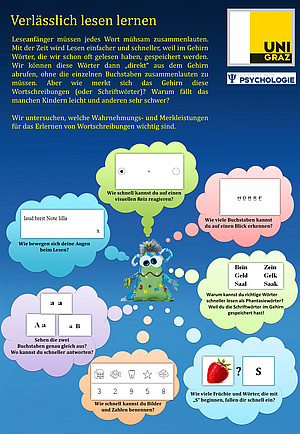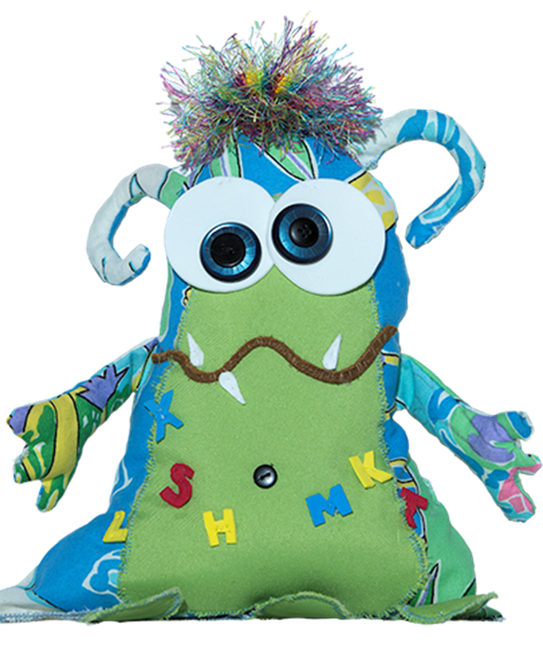Causes of specific reading and spelling disorders
Learning to read reliably
The focus is on identifying neurobiological foundations and neurocognitive profiles in children with isolated reading and spelling disorders.

Summary
Theoretical background:
Reading and spelling disorder is one of the most common developmental disorders in childhood and adolescence. Numerous studies investigating the core cognitive deficits and the neurobiological basis of reading and spelling disorder have led to a better understanding of this learning disorder. Usually, these studies assume that deficits in reading and deficits in spelling represent one and the same disorder. However, current findings show that reading deficits and spelling deficits can also occur independently of each other and are associated with different cognitive deficits. These findings point to different etiologies of the two disorders.
Aims:
The aim of the present research project was to further specify these differences by analyzing word processing.
Using appropriate methods [analysis of eye movements, EEG and (f)MRI paradigms], the cognitive profiles and neurobiological correlates that explain the dissociations of reading and spelling disorders observed at the behavioral level were recorded.
The project provides a better understanding of the cognitive mechanisms underlying isolated reading disorders and isolated spelling disorders. The results of this project are not only important for the further development of models in the field of written language disorders, but also have significant implications for diagnostics and therapy. The identification of cognitive profiles and a differentiated understanding of the underlying neurobiological mechanisms of isolated reading disorders and isolated spelling disorders form the basis for the development of specific support approaches.
Method:
The project was designed as a bilateral research project (DACH project) in order to achieve synergy effects. The survey at two locations was a prerequisite for the success of the project. This ensured the recruitment of a sufficiently large sample and enabled the analysis on three different levels of observation (behavioral, cognitive and brain level) due to the different expertise contributed to the project by the applicants. The two neurobiological methods [(f)MRI and ERP] were divided between the two locations according to the expertise of the applicants, so that the (f)MRI data were collected in Graz and the ERP data in Munich. The behavioral and cognitive measures (incl. the eye movement experiment) were collected by both partners so that they could be associated with the neurobiological correlates of specific deficit groups.
In an initial screening phase, four groups were selected using class tests to assess reading and spelling performance at the end of the 3rd grade and beginning of the 4th grade: isolated spelling deficiency despite age-appropriate reading development, isolated reading deficiency despite age-appropriate spelling competence, combined reading and spelling deficiency and a control group with age-appropriate performance in reading and spelling. These four specifically selected groups (N=80 per site) took part in three individually administered tests to assess the cognitive profiles and neurobiological correlates associated with isolated reading, isolated spelling and combined reading and spelling disorders. The focus of these surveys was on the investigation of lexical and sublexical processes in word recognition.

Cooperation partner: Dr. Kristina Moll, Ludwig Maximilians University Munich
Project sponsor: FWF & German Research Foundation (DFG)
Duration: 01.04.2015 - 31.03.2018
Publications:
Banfi, C., Koschutnig, K., Moll, K., Schulte-Körne, G., Fink, A., & Landerl, K. (2021). Reading-related functional activity in children with isolated spelling deficits and dyslexia. Language, Cognition and Neuroscience, 36(5), 543-651. https://doi.org/10.1080/23273798.2020.1859569
Moll, K., Gangl, M., Banfi, C., Schulte-Körne, G., & Landerl, K. (2020). Stability of deficits in reading fluency and/or spelling. Scientific Studies of Reading, 24(3), 241-251. https://doi.org/10.1080/10888438.2019.1659277
Banfi, C., Koschutnig, K., Moll, K., Schulte-Körne, G., Fink, A., & Landerl, K. (2019). White matter alterations and tract lateralization in children with dyslexia and isolated spelling deficits. Human Brain Mapping, 40(3), 765-776. https://doi.org/10.1002/hbm.24410
Mehlhase, H., Bakos, S., Landerl, K., Schulte-Körne, G., & Moll, K. (2019). Orthographic learning in children with isolated and combined reading and spelling deficits. Child Neuropsychology, 25(3), 370-393. https://doi.org/10.1080/09297049.2018.1470611
Moll, K., Landerl, K., Snowling, M.J., & Schulte-Körne, G. (2019). Understanding comorbidity of learning disorders: Task-dependent estimates of prevalence. Journal of Child Psychology and Psychiatry, 60(3), 286-294. https://doi.org/10.1111/jcpp.12965
Bakos, S., Landerl, K., Bartling, J., Schulte-Körne, G., & Moll, K. (2018). Neurophysiological correlates of word processing deficits in isolated reading and isolated spelling disorders. Clinical Neurophysiology, 129(3), 526-540. https://doi.org/10.1016/j.clinph.2017.12.010
Banfi, C., Kemény, F., Gangl, M., Schulte-Körne, G., Moll, K., & Landerl, K. (2018). Visual attention span performance in German-speaking children with differential reading and spelling profiles : No evidence of group differences. PLoS ONE, 13, e0198903. https://doi.org/10.1371/journal.pone.0198903
Gangl, M., Moll, K., Banfi, C., Huber, S., Schulte-Körne, G., & Landerl, K. (2018). Reading strategies of good and poor readers of German with different spelling abilities. Journal of Experimental Child Psychology, 174, 150-169. https://doi.org/10.1016/j.jecp.2018.05.012
Gangl, M., Moll, K., Jones, M. W., Banfi, C., Schulte-Körne, G., & Landerl, K. (2018). Lexical reading in dysfluent readers of German. Scientific Studies of Reading, 22(1), 24-40. https://doi.org/10.1080/10888438.2017.1339709
Kemény, F., Banfi, C., Gangl, M., Perchtold, C. M., Papousek, I., Moll, K., & Landerl, K. (2018). Print, sublexical and lexical processing in children with reading and/or spelling deficits: An ERP study. International Journal of Psychophysiology, 130, 53-62. https://doi.org/10.1016/j.ijpsycho.2018.05.009
Kemény, F., Gangl, M., Banfi, C., Bakos, S., Perchtold, C. M., Papousek, I., Moll, K., & Landerl, K. (2018). Deficient letter-speech sound integration is associated with deficits in reading but not spelling. Frontiers in Human Neuroscience, 12, e449. www. frontiersin.org/article/10.3389/fnhum.2018.00449
Banfi, C., Kemény, F., Gangl, M., Schulte-Körne, G., Moll, K., & Landerl, K. (2017). Visuo-spatial cueing in children with differential reading and spelling profiles. PLoS ONE, 12, e0180358. doi. org/10.5061/dryad.863r3
Landerl, K. & Banfi, C. (2017). Dyslexia intervention - What can we learn from neuroscience? Commentary on Bédard, Laplante, and Mercier (2016). Journal of Psychology, 224(4), 303-304. https://doi.org/10.1027/2151-2604/a000268